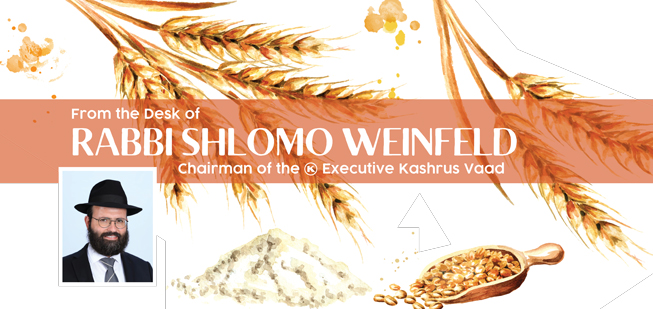Chairman of the OK Executive Kashrus Vaad
When the Beis HaMikdash was standing, Jews from far and near gathered in Yerushalayim on the Shalosh Regalim. On Erev Pesach, they offered the Korbon Pesach, which was eaten on the Seder night with matzah and maror, as an everlasting reminder of our enslaved past, and the miracle of our Exodus from Egypt. The Korbon Pesach, an animal sacrifice, in spiritual terms, signifies the sacrificing of animalistic instincts. Matzah signifies modesty and humility, while chametz signifies arrogance. The maror serves as a reminder of our bitter enslavement in Egypt and is meant to prevent us from becoming complacent and forgetting the pain of others. Until Moshiach comes, matzah is the most important symbol in our present-day Pesach Sedarim.
When OK Kosher certifies shemurah matzah productions, we are meticulous about the process from the moment of harvesting. The wheat for shemurah matzah is grown in dry climates, where rain rarely falls in the spring and summer. In early summer, our mashgichim visit wheat fields to inspect the sheaves and ascertain the earliest time for harvest. We do not wait for the grain to fully mature, rather we harvest before it is fully ripe so that it is no longer connected to the ground and is not susceptible to becoming chometz – leavened – by dew or rain. Mashgichim use a special sensor to make sure that the wheat kernels have a maximum moisture level of 12-15% and the kernels are checked to make sure they are still whole cracked kernels are a sign that the wheat has fully matured).
The harvested wheat is then stored in a controlled environment where it is protected from exposure to moisture. On the evening before the harvest, wheat combines (a versatile machine designed to efficiently harvest grain crops) are carefully cleaned, to make sure they are free of moisture and mud. The harvest itself begins after sunrise when the night’s dew has fully evaporated. The combine itself is operated by a Torah-observant Jew, who performs his duties with the specific intention of fulfilling the mitzvah of making matzah for Pesach. The next steps – the transportation of the grain, the grinding of the flour, and the matzah baking itself – are all carried out under the watchful eyes and direction of a full team of OK mashgichim. According to Chazal, Pesach is not just about the freedom from physical servitude, but also our people’s emancipation of spirit. In addition to the multitude of material requirements in making matzah, there is one additional obligation — every batch of matzah is preceded by the baker’s declaration, “L’shem matzos mitzvah,” that it is being baked to provide matzah for all who would taste freedom in the fulfillment of the Divine command.
The eighth day of Pesach is traditionally associated with our hopes for the coming of Moshiach. For this reason, the Haftorah read on that day contains many prophecies which refer to the era of the Redemption. These final hours were identified by the Baal Shem Tov, founder of Chassidus, as a time of Heavenly favor, during which the light of Moshiach is revealed. Many celebrate this time with a special meal called Seudas Moshiach. Moshiach’s Seudah is intended to deepen our awareness of Moshiach and enable us to integrate it into our thinking processes. Last year, in this special time of Seudas Moshiach, my beloved uncle and mentor, Rabbi Don Yoel Levy, OB”M, who led OK Kosher for decades passed away. His path was always illuminated by the wisdom and the Torah and Chassidic teachings. He was constantly involved in Torah and Halacha and led others by his example. He didn’t just serve as a pioneer in kashrus from behind a desk. His work involved long and arduous travel to production facilities in far-flung corners of the globe, to set kashrus standards globally.
I was privileged to join Rabbi Levy on some of his travels to conduct kashrus inspections and meetings with community leaders. Among the memories that stick out in my mind are of our visits at the OK-supervised matzah bakeries in Israel and Ukraine. For generations, Gedolei Yisroel have joined the wheat harvest and even the baking itself. It’s considered a great zechus, and these rabbis were always careful to participate in each step of the process. It is difficult to describe the joy that Rabbi Levy felt at the privilege of overseeing the shemurah matzah productions; it is an experience that will stay with me forever.
We at OK Kosher are inspired by this example and carry our matzah supervision in this spirit. May we be privileged to follow his path of scrupulously ensuring the highest level of kashrus. May this great festival of freedom bring us good health of mind, body, and soul, and may we soon merit the fulfillment of the words of the Navi Yishayahu, “ והקיצו ורננו שכני עפר – with the coming of Moshiach, Amen.
Rabbi Weinfeld is a member of the OK Kosher Vaad HaKashrus.


 EN
EN  ZH
ZH  KR
KR  BR
BR  ES
ES  IN
IN  IL
IL 




